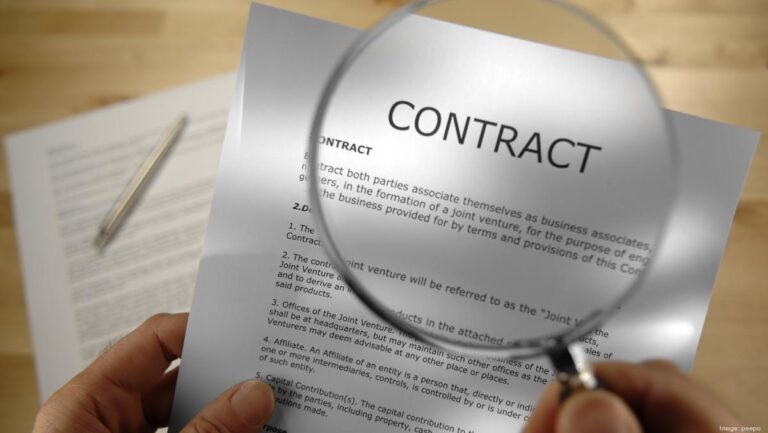A business contract is far more than just a piece of paper signed by two parties. It is the legal foundation of a professional relationship, outlining duties, responsibilities, timelines, and penalties. Whether you’re launching a startup, hiring a freelancer, engaging in a joint venture, or signing a lease agreement, your contract serves as your primary line of defense against disputes and misunderstandings.
Why Many Businesses Overlook Contract Reviews
Despite their importance, business contracts are often rushed or accepted without thorough inspection. This is especially true in fast-paced environments where decision-makers are pressed for time. Some businesses assume standardized contracts will suffice or that mutual understanding is enough to avoid legal issues. Unfortunately, that assumption often leads to costly litigation, misinterpretations, and failed partnerships.

What Does a Business Contract Review Involve?
Examining Language and Clarity
One of the first tasks in a business contract review is to analyze the clarity of the language. Legal jargon, ambiguous terms, and undefined acronyms can make a contract harder to enforce. The review ensures that each section is written in a way that both parties clearly understand their obligations.
Identifying Risk Factors
A proper review identifies legal loopholes, vague clauses, and imbalanced provisions. If a contract unfairly favors one party, or if essential protections like indemnity clauses are missing, it exposes you to future risk. This process evaluates not only what is included but also what is missing.
Validating Legal Compliance
Laws governing contracts vary by jurisdiction, industry, and even transaction type. During the review, the document is assessed for compliance with local, state, and federal regulations. This is crucial to ensure the contract is legally binding and enforceable.
When to Seek a Contract Review
Not every contract requires a full legal audit, but there are key moments when hiring an attorney or contract specialist is a wise decision. These include high-value agreements, employment contracts, investor deals, real estate transactions, and long-term partnerships. If there’s anything you don’t fully understand in the document, it’s better to clarify now than to dispute later.
The Role of a Legal Professional in Contract Review
Tailoring Clauses to Fit Your Business
While templates can provide a helpful starting point, they rarely address the unique needs of your business. Legal experts can help adjust clauses to ensure they reflect your business model, protect your intellectual property, and handle breach scenarios effectively.
Adding Protections You Might Miss
Legal professionals are trained to foresee what might go wrong. They will insert provisions such as non-compete clauses, confidentiality terms, termination conditions, and jurisdiction rules that could become essential if the relationship goes south.
Negotiation Support
A lawyer or contract consultant doesn’t just review contracts—they can also provide support during negotiation. They help you advocate for better terms and ensure that your interests are fairly represented in the final version of the document.
Common Pitfalls Addressed by a Business Contract Review
Misaligned Expectations
When businesses don’t align on deliverables, timelines, or compensation, disputes arise. A contract review ensures that each of these factors is specified in clear, measurable terms, leaving no room for interpretation.
Incomplete Scope of Work
Many contracts fail to detail exactly what services or products are to be provided. Without a clearly defined scope, one party may underdeliver or overcharge, leading to dissatisfaction or legal challenges.
Payment Terms That Hurt Cash Flow
Vague or overly rigid payment terms can create financial strain. During a business contract review, payment schedules, late fees, and invoicing procedures are scrutinized to ensure they align with your financial planning.
How to Prepare for a Contract Review
Gather All Related Documents
Before the review process begins, collect supporting materials such as communications, proposals, and prior drafts. These help provide context to the reviewer and can highlight areas where the final contract diverges from original intentions.
Highlight Your Concerns
Make a list of any clauses or phrases that you find unclear or concerning. This will help guide the review process and ensure that your top priorities are addressed.
Be Ready to Collaborate
Contract review is not a one-way process. Collaborate with your legal advisor or internal team to offer insights into your business operations so the reviewer can tailor recommendations to your context.
Digital Tools That Assist in Business Contract Reviews
AI-Powered Contract Analysis
Emerging technologies are making it easier to automate parts of the review process. AI contract software can flag risky clauses, identify inconsistencies, and even suggest edits. While not a replacement for a legal expert, these tools can speed up the initial review.
Contract Management Platforms
Platforms like DocuSign, Ironclad, and ContractWorks offer features that facilitate the drafting, reviewing, storing, and tracking of contracts. These systems are especially useful for companies managing large volumes of agreements.
Business Contract Review in Mergers and Acquisitions
During mergers or acquisitions, due diligence is paramount—and that includes reviewing all existing contracts. A business contract review in this context evaluates not only the legality of the documents but also their impact on future obligations and valuations.
Buyers must ensure there are no hidden liabilities buried in vendor or employment contracts. Sellers need to validate that agreements are transferable and don’t include termination penalties upon change of ownership. Skipping this stage could significantly alter the deal’s value.
How Contract Reviews Impact Small Businesses
While large corporations often have in-house counsel, small businesses may rely on third-party consultants or freelance attorneys. For them, contract reviews may feel like an added cost—but they should be seen as an investment in long-term stability.
Small business owners frequently sign leases, partnership agreements, vendor contracts, and more. Without a proper review, they risk entering agreements that limit their growth, expose them to legal claims, or lack enforceable protections.
What Happens If You Skip the Review?
Skipping a business contract review can have major consequences. You could agree to unreasonable penalties, waive your rights unknowingly, or become liable for another party’s actions. Lawsuits, financial losses, and reputational damage are all common outcomes.
The costs associated with post-dispute litigation or arbitration far outweigh the upfront investment in reviewing your contract. Prevention is not just better than cure—it’s cheaper too.
Final Thoughts on the Importance of Business Contract Review
In today’s business landscape, verbal agreements and handshake deals are no longer enough. Contracts define your rights, your protections, and your responsibilities. A thorough business contract review is one of the smartest moves a business owner or executive can make—whether you’re drafting something new or renewing an existing agreement.
A properly reviewed contract acts as a strategic shield. It helps prevent misunderstandings, maintains professional boundaries, and ensures you’re not left vulnerable if something goes wrong. In an era of legal complexity, reviewing every contract before signing isn’t just good practice—it’s essential for long-term success.
Frequently Asked Questions
What should I look for in a contract review?
Focus on clear language, risk clauses, payment terms, termination conditions, and legal compliance. It’s best to get professional help to cover all angles.
Do I need a lawyer to review a contract?
Not always, but if the contract has high stakes or unfamiliar legal terms, hiring a lawyer is highly recommended.
How much does a business contract review cost?
Costs vary depending on complexity. Simple reviews may cost a few hundred dollars, while complex contracts or negotiations may require more substantial legal fees.
Can I use templates without a review?
Templates are a good starting point, but they often lack industry-specific clauses. A review helps ensure they are legally sound and suitable for your business.
What happens if a contract is poorly written?
Poorly drafted contracts can lead to disputes, financial losses, or unenforceable agreements. Always review before signing.




